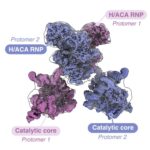About Us
The MRC Laboratory of Molecular Biology (LMB) is a research institute dedicated to the understanding of important biological processes at the levels of atoms, molecules, cells and organisms. In doing so, we provide knowledge needed to solve key problems in human health.
Our scientists tackle fundamental, often difficult and long-term research problems. The LMB has made revolutionary contributions to science, such as pioneering X-ray crystallography and electron cryo-microscopy (cryo-EM) to determine protein structures, the sequencing of DNA and the development of monoclonal antibodies. Twelve Nobel Prizes have been awarded for work carried out by LMB scientists.
The LMB also promotes the application and exploitation of our research findings, both by collaboration with existing companies and the founding of new ones, helping to advance medical research and the translation and application of knowledge.
The LMB provides an unsurpassed environment for both young and established researchers, with state-of-the-art facilities and a unique scientific culture. The LMB has always been very diverse, with a truly international outlook. We currently employ men and women from over 50 countries, and LMB alumni work in research organisations across the world.
Insight on Research
First structure of human telomerase in dimeric assembly

Kelly Nguyen’s group, in the LMB’s Structural Studies Division, have used cryo-EM to visualise telomerase in a dimeric formation for the first time and demonstrated how dimerization is important for telomere maintenance.
How RECQL5 applies the brakes to speeding RNA polymerase II to safeguard genome stability

Suyang Zhang’s group, in the LMB’s Structural Studies Division, has elucidated how the DNA helicase RECQL5 works with the transcription-coupled DNA repair complex to brake and accelerate RNA polymerase II transcription to maintain genome stability.
Quick Links
Latest News
 Juliette Fedry is a Finalist in Eppendorf Award for Young European Investigators
Juliette Fedry is a Finalist in Eppendorf Award for Young European InvestigatorsJuliette Fedry, Group Leader in the LMB’s Cell Biology Division, has been recognised for her research into cellular proteostasis processes in health and disease. […]
 HR Advisors Ash Munday, Christina Karikides and Callum Armstrong reflect on earning their CIPD Diplomas
HR Advisors Ash Munday, Christina Karikides and Callum Armstrong reflect on earning their CIPD DiplomasThe HR Advisors share their motivations and experience of coordinating pursuing the CIPD qualification studies with their job. […]
Latest Publications
- The fantastic voyage: primordial germ cell migration through the developing mouse embryo.
Goodwin, K.
Biochem Soc Trans [Epub ahead of print]. (17th July 2025) - Design of intrinsically disordered region binding proteins.
Wu, K., et al.
Science 389(6757): eadr8063. (17th July 2025) - Quantitative measures of clock protein dynamics in the mouse suprachiasmatic nucleus extends the circadian time-keeping model.
Smyllie, NJ., et al.
EMBO J 44(13): 3614-3644. (17th July 2025) - Genetic Code-Locking Confers Stable Virus Resistance to a Recoded Organism.
Zürcher, JF., Dickson, A., Kappes, T., Kleefeldt, AA., Liu, KC., Salmond, GPC., Chin, JW.
Biochemistry 64(14): 3093-3103. (15th July 2025) - GSK3β phosphorylated tau filaments are probably not like those from AD brains.
Scheres, SHW.
Proc Natl Acad Sci U S A 122(28): e2503730122. (15th July 2025) - The inner nuclear membrane protein, Banf1, has an essential role in triple negative breast cancer cell proliferation and survival.
Rose, M., et al.
Sci Rep 15(1): 25492. (15th July 2025) - From transcription to export: mRNA's winding path to the cytoplasm.
Stewart, M.
Trends Biochem Sci [Epub ahead of print]. (15th July 2025)
See more Publications




